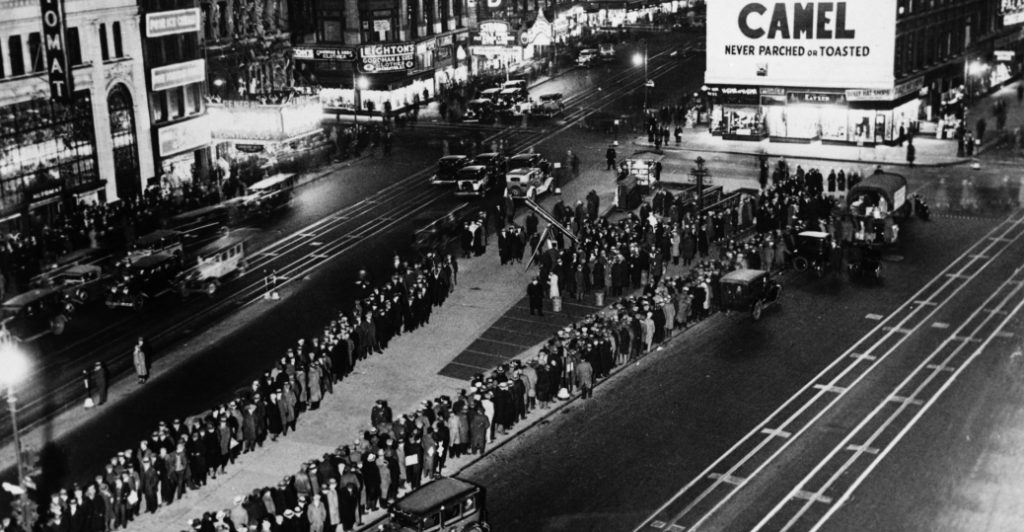
Hello Friend! It’s good to know you’re out there.
Generally, when I think of the Great Depression, it’s imagined in black and white, everything grainy with people wearing lots of wool clothes. I can’t empathize with anyone in the scene because it’s all so distant and different – the clothes, the buildings, the cars, the slang! The Depression sounds like a terrible historic event that happened to my grandparents, but they turned out just fine and gave great hugs. So how bad could it be?
My mother’s mother was always reminding me of how bad it was by telling horror stories that always ended with, “It was hard! It was The Depression!” That’s why fifty years later she filled her chest freezer with discount Wonder Bread and served us powdered milk and Tang for breakfast. “I drank it in the Depression! It was good enough for me!”
I don’t think they had Tang back then, though.
My father’s father was 20 in 1929, the year of the Stock Market Crash, living in New York City, so he had plenty of stories. Endlessly resourceful, he lucked into a job as a window dresser for W.T. Grant’s, an old department store chain, and eventually climbed up to assistant manager of a store in upstate New York.
When I asked him about the Depression, all he had to say was, “Sure, things were tough. I was lucky to have a job. Plenty of people didn’t.” And that was it. Not much color to add to my black and white visions of the past.
The Great Depression has been on my mind because it’s probably the last time the entire world was beset by the same crisis. What we’re enduring – and likely will for a while – is as big as the Depression in impact and how many people it affects. In one morning this week I heard from friends in Cairo, Mumbai, and Islamabad, grousing about life under stay-at-home orders. No matter the continent, we’re all bored at home, scared of the same virus, and worried about the future of our jobs, our national economies.
Talking to my grandparents about the Great Depression, one of the struggles I had was this disconnect between me and them. I mean, I was asking them about a MAJOR EVENT that earned pages in my history textbooks. But to them it was part of a lived life, filed away in their brains next to dance crazes, fights with old friends, popular songs no longer played on the radio, and memories of family members long passed.
How do you tell your experience of a sweeping historic event when so much of it seems mundane, and the real experience is so much more personal? For instance, is it because of the Depression that my great grandparents turned their South Shore Chicago home into a boarding house to get by, and that they choose to look the other way when creepy boarders tried to molest my grandmother, because the men paid their rent on time?
Or that my grandfather in New York usually worked twelve hour days, six days a week, for $10 a week, and that his boss often threatened to fire him?
Were those Depression stories? Or just a lived life?
So, here we are now, living through a major event that will most certainly earn pages in future history textbooks. It seems unlikely the virus will be cured any time soon, so even if we slough off stay-at-home orders, death and sickness will carelessly course through our society, picking off unfortunates and loved ones for some time.
Whether we are ready to admit it or not, everything has changed, although like for people in October 1929, it’s not entirely clear to us exactly how everything has changed. For now, it seems like there will be a lot fewer luxuries in the near future. I’m probably not taking my family overseas anytime soon, and I’m not entirely sure we’ll get to use the August vacation house we paid for already.
But that’s easy stuff. Layoffs are already beginning, and like in 1929, the white collar office jobs will probably be the last to go. What happens to those of us who depend on employer-paid health insurance, living with overly-leveraged home mortgages, or paying for kids in private school and college? What about the millions of high schoolers and college students who will basically miss a whole semester of education?
These are the changes we can imagine, but a cascading series of secondary and tertiary effects are coming, forever altering our world so that there will be a “before COVID” and “after COVID”.
The Pandemic is the structure of our lived reality now; the framework for every story told, good and bad, to future generations.
Our children have become our grandparents, future providers of great hugs, with hazy childhood memories of the plight, and we are our great grandparents, who trudged through the crisis, remaining distant and unrelatable, with woolen clothes and black and white existences.